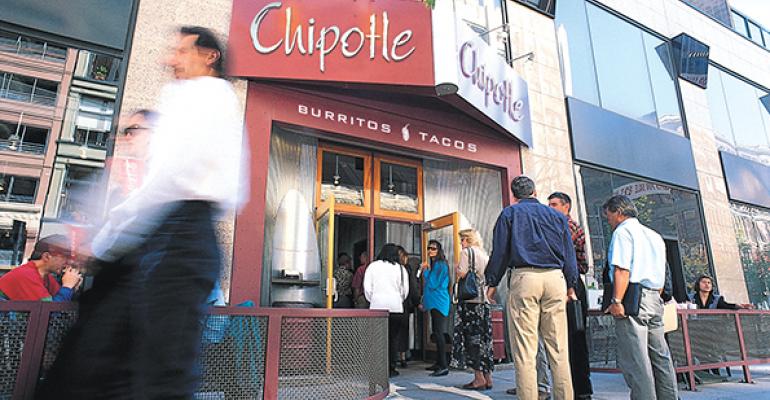Free burritos drive traffic.
So concluded top Chipotle Mexican Grill Inc. executives during a presentation to Wall Street analysts Wednesday at the Bank of America Merrill Lynch 2016 Consumer and Retail Tech conference, which outlined the chain’s recovery during February and early March after hitting new lows in January.
In filings Tuesday, the Denver-based fast-casual operator said same-store sales declined 26.1 percent in February. But that was a marked improvement from the 36.4-percent sales slide in January, after multiple foodborne illness outbreaks sickened customers over the second half of 2015.
The improving sales, which continued into the first two weeks of March, were a direct result of free offers that began on Feb. 8, when the company closed all domestic restaurants for lunch for a town hall meeting. Restaurants displayed signs offering customers a rain check for a free burrito, bowl or salad via text coupon.
Mark Crumpacker, Chipotle chief creative and development officer, said the company expected about 2.5 million people to ask for the rain check, but over the roughly five-hour period it was offered, 5.3 million people requested the free burrito, at one point reaching 14,000 people per minute during its peak.
Additionally, an estimated 67 percent of those customers redeemed the offer, which is “extraordinarily high,” Crumpacker said.
“We did see a very nice lift in transactions,” he said. “That was our first indication that people were ready to come back to Chipotle That offer was successful. There may be more offers like that forthcoming.”
Chipotle expects to send about 21 million direct mail pieces by May 15 with more offers of freebies. The chain is also continuing its largest traditional marketing effort in company history, with outdoor, print ads, online and social media in 31 markets running simultaneously.
The freebies are prompting consumers to come back as paying customers, noted Jack Hartung, Chipotle chief financial officer.
As freebie transactions declined, paid transactions began to grow, indicating that customers were returning without the offer of a discount.
News last week about a restaurant outside Boston closing temporarily after employees were sickened caused what company officials called a “blip” or “hiccup” in the steady recovery during the second week of March.
Ells explained that the restaurant was closed briefly for sanitation after several employees who attended the same high school where there was a norovirus outbreak called in sick, as is now required by Chipotle’s stricter food safety protocols. There were no reports of customer illness associated with the restaurant.
A parent of one of the high school students notified the press, however, alerting the local health department and prompting Chipotle to voluntarily close the restaurant for sanitation.
Eventually, Ells said, the media will recognize such incidents are “not a story.”
“We’re proud of what the team did, that they didn’t work while sick and no customers were affected,” Ells said. “Unfortunately, it was spun to the negative, but we will continue to act out of an overabundance of caution.”
For the first quarter, Chipotle expects to report a loss for the first time as a public company. Margins will take a bigger than anticipated hit because costs have been higher than previously expected, Hartung said.
In addition to the costs associated with the marketing push, the food safety protocols have resulted in higher labor costs and more food waste, in part because sales have been difficult to accurately predict, he said.
Officials never pinpointed the source of the two E. coli outbreaks that sickened 60 people in 14 states, but Ells said the company has a pretty good idea about what caused it, although he declined to say what it was.
Citing unnamed sources, The Wall Street Journal reported that beef imported from Australia may have been the source that ultimately cross contaminated other ingredients, although federal authorities leaned more toward produce as the source.
On Tuesday, Chipotle said it had hired meat safety expert James Marsden as the chain’s new executive director of food safety. Marsden was previously the Regent’s Distinguished Professor of Food Safety and Security at Kansas State University’s Animal Science and Industry Department.
Meanwhile, Ells confirmed that Chipotle is pre-cooking beef using the sous vide method commonly used by higher-end restaurants.
“It’s a technique that was invented by chefs in the 1970s, and is still widely used by top chefs and restaurants all over, where you can precisely cook proteins and hold them at temperature,” Ells said.
The result is a more tender steak that is essentially “pasteurized” to eliminate potential pathogens, he said. The meat is still marinated in house, heated and chopped for burritos, bowls or salads, as it was prior to the crisis.
“These things make the food safer, but also actually make it taste better,” Ells said.
The Wall Street Journal also cited unnamed sources saying that Chipotle was considering stepping back from some food safety practices, including the pathogen testing of some ingredients.
Chris Arnold, Chipotle spokesman, said, “We are not backing off on anything as it relates to food safety.”
If anything, the chain is adding more protections to existing protocols, which include prepping some produce items in central kitchens, blanching some produce in restaurants and testing ingredients.
“If we make any changes with food safety programs — whether to the way we prep or cook food, to testing protocols, or to other food safety procedures — they are changes for the better,” he added. “The sum of the actions we have already taken has greatly reduced risk and we are implementing a very advanced food safety system.”
Meanwhile, Hartung told analysts that sales and margins will recover.
“But we’re going to have to earn it every single day,” he said. “We’re going to have to prove that our food is safe.”
Contact Lisa Jennings at [email protected].
Follow her on Twitter: @livetodineout





